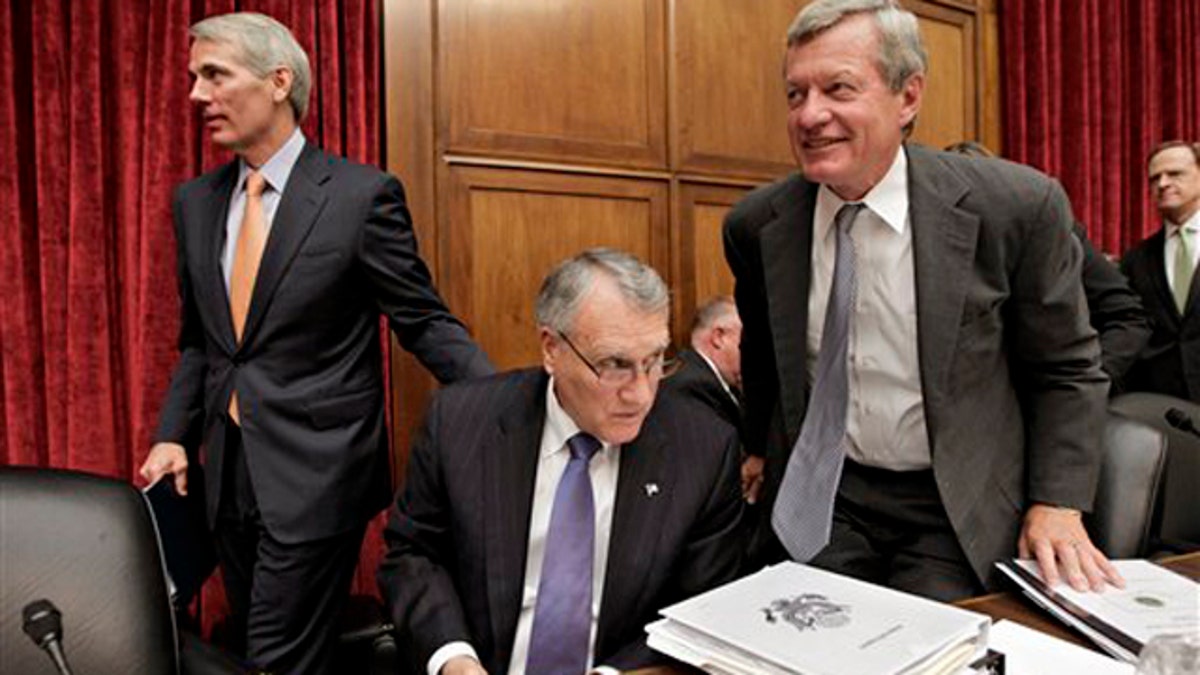
Sen. Jon Kyl, center, Sen. Max Baucus, right, and Sen. Rob Portman, left, finish with a meeting of the Joint Select Committee on Deficit Reduction on Capitol Hill in Washington Sept. 8. (AP)
Military hawks are launching an offensive move against the possibility of deeper Pentagon cuts, as one member of a bipartisan "super committee" trying to find $1.5 trillion in deficit savings by Thanksgiving warned Thursday against hacking too much from the defense budget.
Panel lawmakers opened work Thursday with cheery statements about the need to compromise and follow through on the committee's mandate. But cracks started to show within hours of opening statements, as member Sen. Jon Kyl, R-Ariz., said during an address that he would not serve on the committee if it considers more defense cuts.
"I'm off the committee if we're going to talk about further defense decreases," he said.
The debt-ceiling deal that created the committee already prescribed $350 billion in military cuts over the next decade. Kyl, and others, don't want the committee to go beyond that.
They're particularly concerned, though, about the "trigger" mechanism underlying the committee -- if the committee does not find at least $1.2 trillion in cuts, the absence of a deal would "trigger" sweeping cuts to entitlements and the military. The Pentagon cuts would total about $600 billion.
Kyl has said that he would push to waive the defense trigger.
House Armed Services Committee Chairman Buck McKeon, R-Calif., told Fox News he knows the idea behind the trigger is to make it so painful as to compel the super committee to work something out.
But he expressed concern that the defense budget has been hit hard enough.
His message to the super committee: "Leave us alone."
McKeon held a hearing Thursday to examine budget challenges facing the Pentagon.
Retired Navy Adm. Edmund Giambastiani, former vice chairman of the Joint Chiefs of Staff, said at the hearing that the trigger would amount to "performing brain surgery with a chainsaw."
"Huge cuts to defense spending, combined with little to no analysis of their impact on our overall national security would have devastating consequences," he said.
Defense Secretary Leon Panetta made similar remarks last month.
McKeon said Thursday that military cuts would raise security concerns but also economic ones.
"While it's true that our military power is derived from our economic power, we must recognize that this relation is symbiotic. Cuts to our military defense, either by eliminating programs or laying off soldiers, comes with an economic cost," he said.
At the same time, some want the committee to cut defense spending. Others are putting more focus on protecting entitlements from deep cuts -- though entitlements appear to be a likely target in the talks.
At the opening meeting Thursday, Rep. James Clyburn, D-S.C., urged the committee to make "smart and compassionate" cuts.
"Unending military adventurism need not be accompanied by slashing essential services like public education ... and earned benefits like Social Security, Medicare and Medicaid," he said.
Rep. Jeb Hensarling, R-Texas, noted that the debt also "threatens our national defense."




